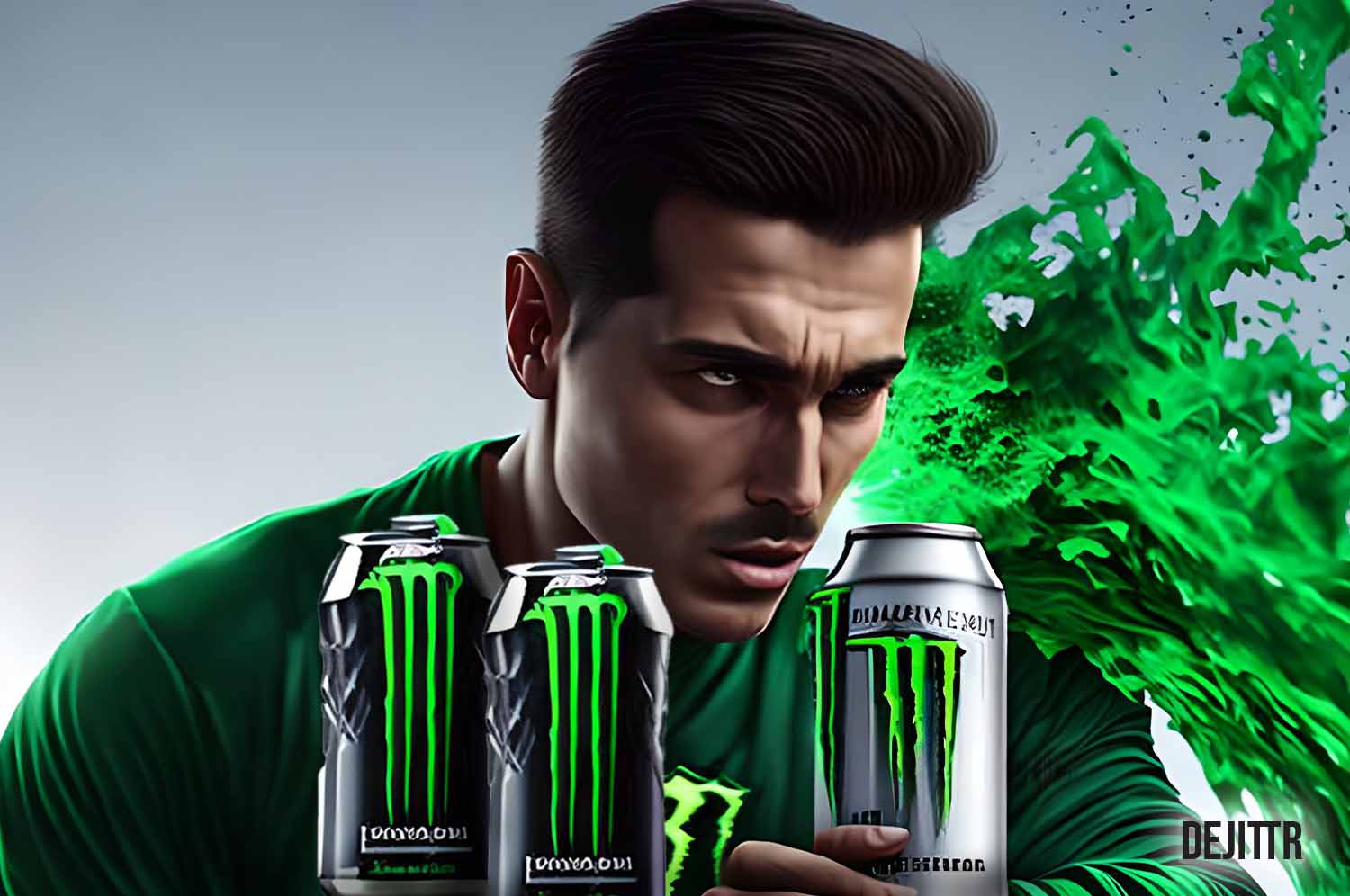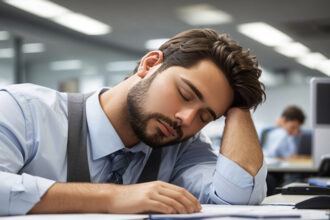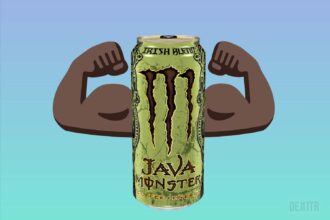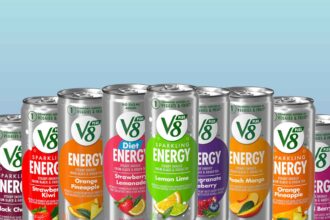Do you rely heavily on energy drinks to get through the day? Do you reach for another can of Monster when you’re tired or sluggish?
While energy drinks like Monster can give you a quick energy boost, consuming too much can have serious consequences for your health.
Key Takeaways:
Possible health issues such as increased heart rate, increased blood pressure, insomnia, headaches, dizziness, irritability, and stomach discomfort can occur when over-consuming Monster Energy Drink. Hence, it is recommended to have no more than one can of Monster Energy drink a day.
Keep reading to get a detailed analysis on the effects of Monster Energy Drink overconsumption and other crucial information related to this topic.
How Much Caffeine Is Present In Monster Energy Drink?
Let’s start by talking about the caffeine content in Monster Energy Drink. One can of Monster contains 160 mg of caffeine, which is about the same as roughly, two cups of coffee.
Caffeine is a natural stimulant found in coffee, tea, chocolate, and other foods and drinks. It works by blocking the action of a neurotransmitter called adenosine, which is responsible for promoting sleep and suppressing arousal.
When adenosine is blocked, other neurotransmitters like dopamine and norepinephrine are able to increase, leading to increased alertness, focus, and energy.
When you consume an energy drink like Monster, the high caffeine content can give you a quick burst of energy and help you feel more alert and focused. This can be especially helpful if you’re feeling tired or sluggish and need a quick pick-me-up to get through the day.
However, it’s important to remember that caffeine is a powerful stimulant and can have negative effects if consumed in excess.
And here’s the thing: It’s not uncommon for people to drink multiple cans of Monster in a day, which can quickly add up to a dangerous level of caffeine consumption.
What Happens When You Over-Consume Monster Energy Drink?
The potential risks of monster energy drink overconsumption are numerous and serious. Here are just a few:
- Insomnia – Consuming too much caffeine can interfere with your ability to fall asleep and stay asleep, leading to insomnia and other sleep disorders.
- Dehydration – Energy drinks like Monster can be dehydrating, which can lead to headaches, dizziness, and other symptoms.
- High Blood Pressure – Caffeine can temporarily raise blood pressure, and consuming too much can lead to long-term increases in blood pressure, which can increase the risk of heart disease and stroke.
- Anxiety and Nervousness – Caffeine is a stimulant that can increase feelings of anxiety and nervousness, especially in people who are already prone to these conditions.
- Digestive Issues – Consuming too much caffeine can lead to digestive issues like stomach pain, diarrhea, and nausea.
- Addiction – Like other forms of caffeine, Monster Energy Drink can be addictive, leading to dependence and withdrawal symptoms when consumption is reduced or stopped.
Related Read: Top 10 Negative Effects of Energy Drinks
To illustrate the potential risks of overconsuming Monster Energy Drink, here’s a table that lists the possible side effects of consuming 1-6 cans in a day and gives you a rough idea:
| Number of Cans Consumed: | Potential Side Effects: |
| 1 | Mild increase in energy |
| 2 | Increased heart rate, mild anxiety |
| 3 | Difficulty sleeping, dehydration |
| 4 | Nausea, digestive issues |
| 5 | Severe dehydration, high blood pressure |
| 6 | Increased risk of heart attack or stroke |
Monster Energy Drink Ingredient Analysis
- Carbonated water: The base of the drink, which provides the fizz.
- High fructose corn syrup: A sweetener derived from corn that’s used to give energy drinks their sweet taste.
- Glucose: A type of sugar that’s easily absorbed by the body and provides a quick source of energy.
- Citric acid: A weak organic acid that’s used as a preservative and to give the drink a sour taste.
- Natural and artificial flavors: Chemical compounds that are added to the drink to give it its unique taste.
- Taurine: An amino acid that’s naturally found in the body and is believed to help improve athletic performance and reduce fatigue.
- Sodium benzoate: A preservative that’s used to prevent the growth of harmful bacteria and mold.
- Caffeine: A natural stimulant that’s found in coffee, tea, and other foods and drinks. It’s used to provide a quick burst of energy and improve focus and alertness.
- Sorbic acid: A preservative that’s used to prevent the growth of bacteria and yeast.
- Sucralose: An artificial sweetener that’s used to give the drink a sweet taste without the calories.
- Benzoic acid: A preservative that’s used to prevent the growth of bacteria and mold.
- Panax ginseng root extract: A natural herbal supplement that’s believed to help reduce stress and improve mental and physical performance.
- L-carnitine: An amino acid that’s naturally found in the body and is believed to help improve muscle function and reduce fatigue.
- Inositol: A type of sugar that’s found in many foods and is believed to help improve mental and physical performance.
- Guarana seed extract: A natural source of caffeine that’s believed to help improve energy and mental focus.
It’s important to note that while many of these ingredients are considered safe for consumption in moderation, consuming energy drinks like Monster on a regular basis can have negative health effects due to the high levels of sugar, caffeine, and other stimulants. It’s recommended that individuals consume energy drinks in moderation and opt for healthier alternatives like water or natural fruit juices.
How Many Monsters Can You Safely Have In A Day?
As a general rule, drinking no more than 1 can of monster energy drink a day is safe. As you take more than that, you increase the chances of caffeine overdose and excess sugar intake, both of which can be harmful to health.
Energy drinks like Monster are loaded with synthetic caffeine, sugar, and other stimulants that can have serious health effects when taken in excess.
The high levels of caffeine and sugar in energy drinks can cause serious side effects like trouble sleeping, anxiety, fast heart rate, increased blood pressure, jittery feelings, tremors, headache, and even seizures and cardiac arrhythmias.
| Ingredients | 1 Monster Energy Drink Can | Maximum Limit Per Day |
| Caffeine | 160 mg | 400 mg |
| Sugar | 54 g | 24 g for women, 36 g for adult men |
The maximum daily limit of caffeine consumption is 400 mg in a day. The one 16 oz can of Monster energy drink contains 160 mg of caffeine. So that is still under the recommended upper limit of caffeine intake in a day.
But let’s face it, it can be tempting to drink that one more can when you love your energy drinks, right? And that’s how the caffeine intake doubles up! Two cans of Monster energy drink – and you’re suddenly consuming 320 mg of caffeine. Likewise, three – and you have already crossed the maximum caffeine intake limit.
Now we could have told you that you can safely drink just 2 cans of Monster energy drink a day since its caffeine content is still below the threshold value. But there’s a catch – we also need to consider the excess sugar content in the monster energy drink.
As you may have seen in the above chart, the Monster Energy drink already has excess sugar than the recommended level of sugar intake for men and women. And it won’t be a wise decision to have more cans of the energy drink considering that point.
Excess sugar intake can lead to obesity, blood pressure, and blood sugar-related problems. So it is recommended to drink only one can of Monster energy beverage occasionally, when you really need an additional boost to energize your day.
Tips To Avoid Overconsumption Of Monster Energy Drink
First off, it’s important to limit the amount of energy drinks you consume. It’s easy to get carried away, especially when you’re feeling sluggish and need a quick pick-me-up. But too much of a good thing can quickly turn bad, leading to jitters, heart palpitations, and other unpleasant side effects. So, pace yourself and don’t go overboard.
Another thing to remember is to avoid mixing energy drinks with alcohol. It might seem like a good idea at the time, but trust me, it’s not. Mixing these two beverages can be a recipe for disaster, leading to dehydration, and heart problems.
Speaking of caffeine, make sure to read labels and be aware of the caffeine content in energy drinks. Some drinks can contain as much caffeine as multiple cups of coffee, which can lead to caffeine overdose if consumed in large quantities. So, be smart and read those labels.
Last but not least, drink plenty of water. This is a no-brainer, but it’s worth mentioning. Staying hydrated is important for your overall health and can also help prevent the negative side effects of overconsuming energy drinks. Plus, water is always a good choice, whether you’re feeling sluggish or not.
So there you have it, some tips to help you avoid overdoing it with energy drinks. Remember, moderation is key, and always prioritize your health and well-being. Cheers to making smart beverage choices!













